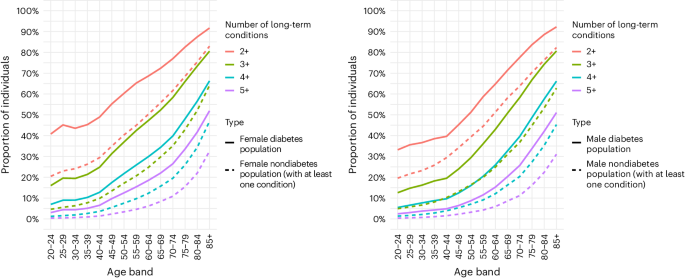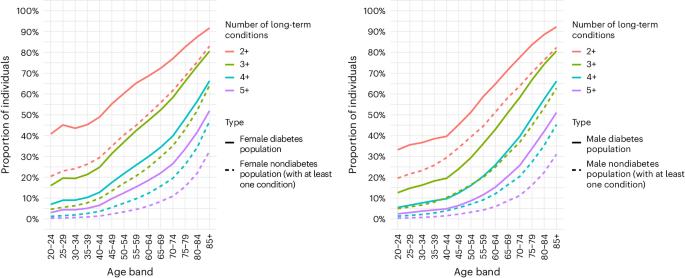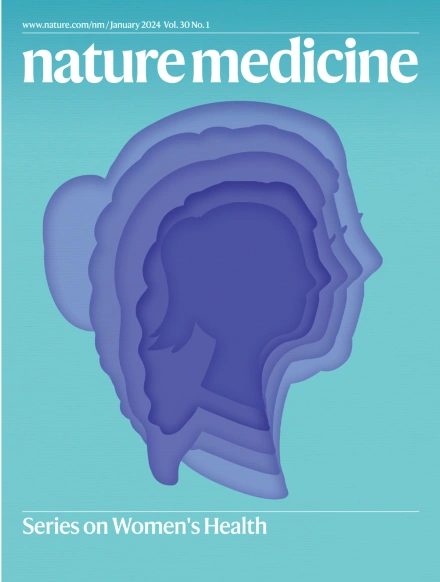The burden of diabetes-associated multiple long-term conditions on years of life spent and lost
IF 50
1区 医学
Q1 BIOCHEMISTRY & MOLECULAR BIOLOGY
引用次数: 0
Abstract
Diabetes mellitus is a central driver of multiple long-term conditions (MLTCs), but population-based studies have not clearly characterized the burden across the life course. We estimated the age of onset, years of life spent and loss associated with diabetes-related MLTCs among 46 million English adults. We found that morbidity patterns extend beyond classic diabetes complications and accelerate the onset of severe MLTCs by 20 years earlier in life in women and 15 years earlier in men. By the age of 50 years, one-third of those with diabetes have at least three conditions, spend >20 years with them and die 11 years earlier than the general population. Each additional condition at the age of 50 years is associated with four fewer years of life. Hypertension, depression, cancer and coronary heart disease contribute heavily to MLTCs in older age and create the greatest community-level burden on years spent (813 to 3,908 years per 1,000 individuals) and lost (900 to 1,417 years per 1,000 individuals). However, in younger adulthood, depression, severe mental illness, learning disabilities, alcohol dependence and asthma have larger roles, and when they occur, all except alcohol dependence were associated with long periods of life spent (11–14 years) and all except asthma associated with many years of life lost (11–15 years). These findings provide a baseline for population monitoring and underscore the need to prioritize effective prevention and management approaches. In a national study of 46 million adults, living with diabetes-related multiple long-term health conditions(MLTCS), particularly during young adulthood, led to extended periods of time with MLTCS, while also substantially reducing the years of life.


与糖尿病相关的多种长期病症对所耗费和损失的生命年数造成的负担。
糖尿病是多种长期病症(MLTCs)的主要诱因,但基于人群的研究尚未明确描述其在整个生命过程中的负担。我们估算了 4600 万英国成年人中与糖尿病相关的 MLTCs 的发病年龄、寿命年数和损失。我们发现,发病模式超越了典型的糖尿病并发症,并加速了严重多发性并发症的发病,女性提前 20 年,男性提前 15 年。到 50 岁时,三分之一的糖尿病患者至少患有三种疾病,患病时间超过 20 年,死亡时间比普通人群早 11 年。50 岁时每增加一种疾病,寿命就会减少 4 年。高血压、抑郁症、癌症和冠状动脉心脏病是造成老年期多发性硬化症的主要原因,也是造成社区层面花费年数(每 1,000 人花费 813 至 3,908 年)和损失年数(每 1,000 人损失 900 至 1,417 年)的最大负担。然而,在较年轻的成年期,抑郁症、严重精神疾病、学习障碍、酒精依赖和哮喘的作用更大,而且当这些疾病发生时,除酒精依赖外,其他疾病都与较长的生命耗费期(11-14 年)有关,除哮喘外,其他疾病都与较长的生命损失年限(11-15 年)有关。这些发现为人口监测提供了一个基线,并强调有必要优先考虑有效的预防和管理方法。
本文章由计算机程序翻译,如有差异,请以英文原文为准。
求助全文
约1分钟内获得全文
求助全文
来源期刊

Nature Medicine
医学-生化与分子生物学
CiteScore
100.90
自引率
0.70%
发文量
525
审稿时长
1 months
期刊介绍:
Nature Medicine is a monthly journal publishing original peer-reviewed research in all areas of medicine. The publication focuses on originality, timeliness, interdisciplinary interest, and the impact on improving human health. In addition to research articles, Nature Medicine also publishes commissioned content such as News, Reviews, and Perspectives. This content aims to provide context for the latest advances in translational and clinical research, reaching a wide audience of M.D. and Ph.D. readers. All editorial decisions for the journal are made by a team of full-time professional editors.
Nature Medicine consider all types of clinical research, including:
-Case-reports and small case series
-Clinical trials, whether phase 1, 2, 3 or 4
-Observational studies
-Meta-analyses
-Biomarker studies
-Public and global health studies
Nature Medicine is also committed to facilitating communication between translational and clinical researchers. As such, we consider “hybrid” studies with preclinical and translational findings reported alongside data from clinical studies.
 求助内容:
求助内容: 应助结果提醒方式:
应助结果提醒方式:


